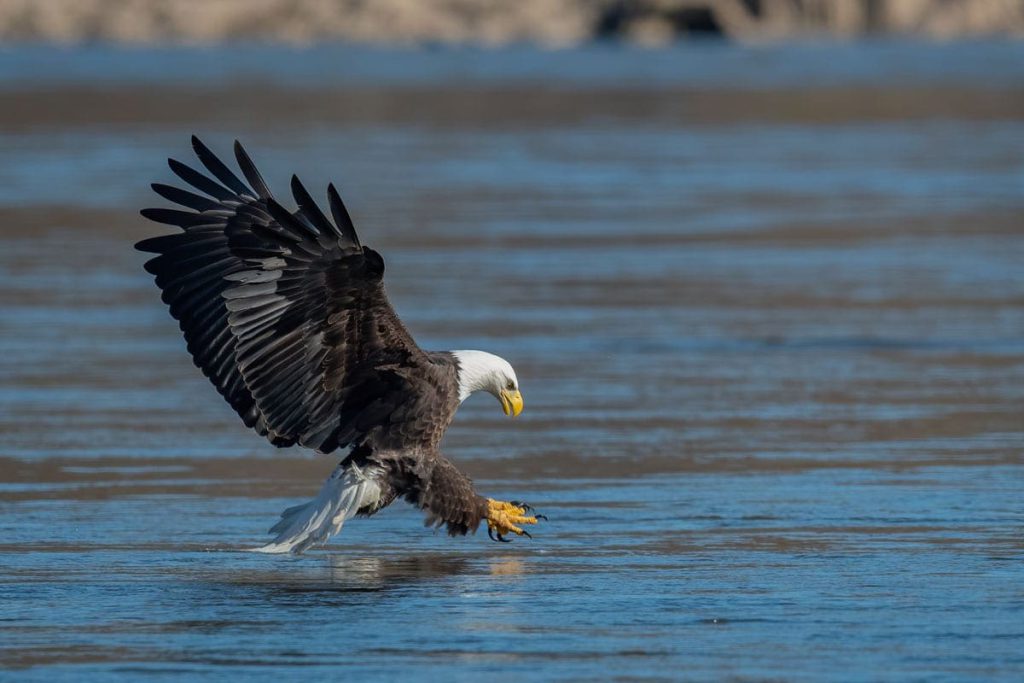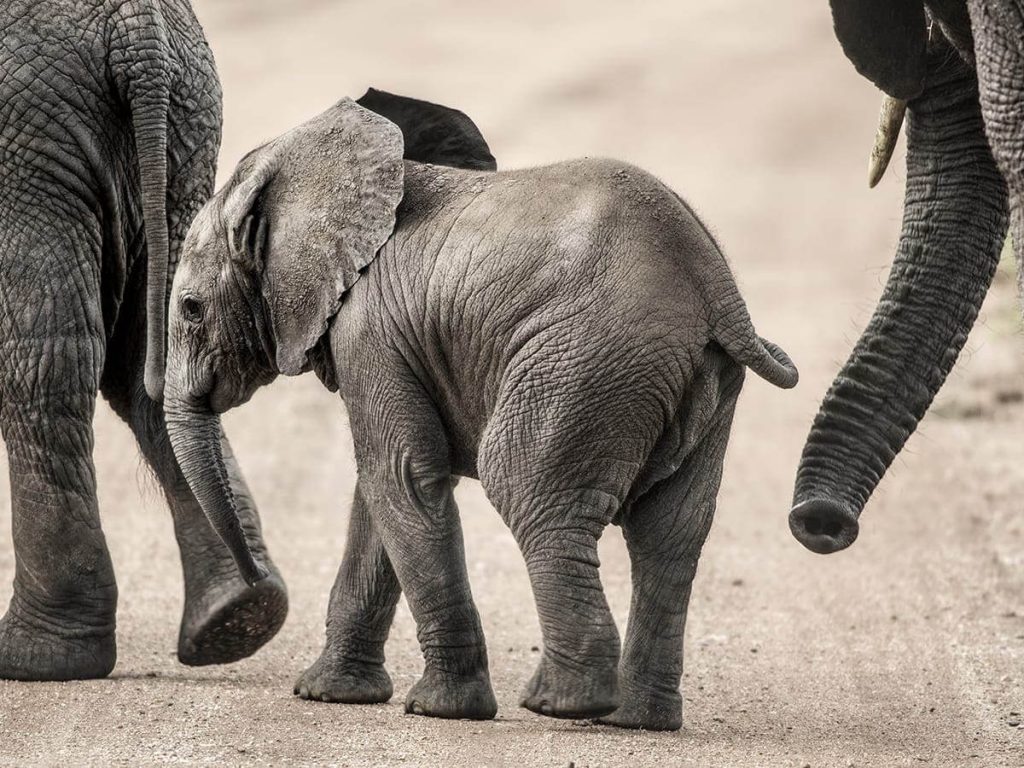

For students who love animals and are interested in a career that supports environments and local ecosystems, a career in the field of wildlife may be the right path to take. This is a diverse area that includes both jobs that involve working directly with wildlife along with some careers—like managing wildlife preserves or organizations—that may place you in more of an administrative role. No matter what, wildlife conservation jobs are the kind of work that you can feel good about since it directly supports conservation in very important ways.
A college education geared toward this career path will help ensure your chances of success. Many of these jobs are looking for people with a Bachelor of Science in Captive Wildlife Care or in Wildlife and Fisheries Biology, both of which are degrees that Unity College offers as hybrid learning programs. Read below to learn more about the types of jobs you can expect to find and the steps you’ll need to take to land your dream career!
Types of Wildlife Jobs
These jobs are plentiful if you know where to look—and they are quite diverse in scope, too. There are more jobs working with wildlife out there than we can possibly list here, but below you’ll find a selection of careers in this area of study along with the types of things you’ll be doing in these fields.
- Wildlife managers may work in both administrative and field jobs to manage wildlife populations, habitat or to direct people in how to best benefit wildlife.
- Biologists may spend time in both the field and the lab as they collect and analyze data to benefit wildlife populations.
- Wildlife educators may work in schools, universities or public-facing programs geared toward educating people about biology, ecology, habitat and conservation. Some wildlife educators also work in public relations, educating the public about wildlife and conservation.
- Veterinarians specializing in wildlife need a different blend of education from traditional veterinarians in that they’ll need to learn how to handle undomesticated animals.
- Zookeepers oversee the care of a zoo’s population, which is a blend of hands-on work, administration, and sometimes public relations. At larger zoos, your role may be quite specialized as you find yourself working with certain types of animals, insects or marine life. These institutions also have need for public relations specialists and people to manage budgets and other details concerning day-to-day operations. Smaller zoos will have much of the same work, but with fewer employees. You may find yourself doing a variety of tasks on any given day.
- Beekeepers are a niche career that will have you overseeing colonies of honeybees.
- Aquarists are another niche career in which you will oversee and care for marine life kept in aquariums.
- Game wardens and wildlife officers blend wildlife experience with law enforcement in that they are responsible for surveying local game, checking licenses for hunting and fishing, and enforcing local wildlife regulations.
In this field, you also find technicians, analysts, consultants, economists, public relations specialists and more. Different positions will blend work in the field, public-facing work, or administrative work, which means there are a number of opportunities to help you find the right work environment for you.
How to Decide Which Career Path You Want to Take
Choosing a career path is an important task in life, as mentioned above. Although all relating to animals, different careers will offer varying opportunities and life choices. For example, if you are interested in the business side of things, juggling income and expenses, you can choose to be a wildlife manager and handle the well-being of your habitat through administrative means. For those who are more health-conscious with their pets or intend to do hands-on care with animals, perhaps being a veterinarian is the right path for you.
But it’s not just all about passion. Aside from interests, there are a couple of primary considerations when deciding what your career path should be. The first will be your salary. Across careers, you can expect a wide range of salaries between $60,000 per year all the way up to $160,000 per year. Keep in mind that on the higher end of the pay scale you’ll need more education—like a D.V.M. to become a veterinarian, for example—and likely more years of experience in order to earn the highest wages possible. At the lower end of the pay scale, you will find entry-level jobs like conservation officers, biologists, and more.
The other thing to consider is the type of environment in which you’d like to work. While there will be exceptions, typically, these jobs can lead you into work in the field—outside in forests, fields and streams analyzing, gathering data, or working directly within the ecosystem—work in a laboratory, or work in an office. Some jobs, like biologist roles, may even give you a blend of all three environments. Consider the types of environments you would most likely be interested in, and tailor your education to pursue those particular paths.
Internships and Volunteer Opportunities
Careers working with wildlife are highly sought after and therefore can be very competitive—which means that you’ll need an edge to land that dream job! Your education will help immensely, of course, but to get a leg up on other applicants, it helps to build out your resume with demonstrable experience.
One of the best ways to do that is through internships and volunteer opportunities. Volunteering is especially popular where wildlife related careers are concerned because all around the United States there are organizations devoted to helping animals who rely on volunteer workers. Opportunities can be found through zoos, wildlife rehabilitation centers, state and national parks, and wildlife preserves. There are also animal shelters, horse therapy programs and more who accept volunteers and will give you some experience in working with animals.
Another volunteer opportunity might be in your own backyard! Start today with your community and find out what really attracts you. Begin your work with local shelters or schools that offer plans and courses in dealing with animal welfare and biology. It can even start as small as offering services to your neighbors by taking their pets on a walk, for example. While it might seem inconsequential, this could help you gain experience handling animals and help you determine whether you would like to go further into a career in which animal care is a daily reality.
Volunteering your time to help within animal-focused community organizations is a great way to build up your interests and character. Check local animal shelters, zoos, and conservation groups for opportunities to get involved. Of course, you can also jump straight into more relatively advanced programs offered by community colleges for wildlife, too, but every bit of experience you gain is something you can add to your future resume.
When it comes to internships, in many of these places—like zoos or large wildlife associations—administrators may also be looking for interns. Check around for opportunities that most closely match your planned career path, but don’t hesitate to branch out a little bit, too. For example, if you plan to work with a wildlife preserve, experience with an animal shelter, while not as relevant as volunteering for wildlife organizations, can still help demonstrate that you have experience working with animals.
Benefits of a Hybrid Learning Program
A hybrid learning program offers all the flexibility you need to complete your degree in the way that works best for you. With hybrid learning, you can complete your degree with a mix of in-person and online coursework, depending on your needs. This lets you complete your degree quickly or gives you the chance to slow down and get the traditional on-campus experience if that’s more your speed. Unity College offers hybrid learning for the following bachelor’s degrees:
- Conservation Law Enforcement
- Wildlife and Fisheries Biology
- Environmental Studies
- Captive Wildlife Care
At Unity College, you have the option to choose from eight different start dates where you can switch between in-person and online learning. The term structure for hybrid students is unique, with terms that are five weeks long and a maximum of two classes per term. This means you can focus your attention on fewer classes at a time, allowing you to absorb the material better than you would if your attention was spread thin across six classes. This unique scheduling also allows students more flexibility to allocate time toward part-time jobs or internships to gain career experience and explore potential career interests.
Hybrid learning is also more affordable. When calculating tuition, Unity College differentiates between online and in-person learning. Online learning is less expensive per credit hour, so with the ability to switch between online and in-person learning, you can earn your degree in the way that is most affordable for you.
You even have the freedom to live on campus while taking online courses. Instead of committing to a full semester of on-campus housing, you can apply to live on campus for five weeks, 11 weeks, or 17 weeks, each with different pricing. The same structure applies to dining plans. This means if you’re looking for greater flexibility when it comes to spending for college, hybrid learning is the perfect path for you.
If you are interested in learning more about the wildlife degrees offered within the hybrid learning program at Unity College, contact us today.



